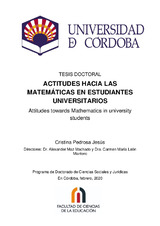Actitudes hacia las matemáticas en estudiantes universitarios
Attitudes towards Mathematics in university students
Autor
Pedrosa Jesús, Cristina
Director/es
Maz-Machado, AlexanderLeón-Mantero, Carmen
Editor
Universidad de Córdoba, UCOPressFecha
2020Materia
Actitudes hacia las matemáticasEstudiantes universitarios
Género
Titulación
Attitudes towards mathematics
University students
Gender
Degree
METS:
Mostrar el registro METSPREMIS:
Mostrar el registro PREMISMetadatos
Mostrar el registro completo del ítemResumen
Esta investigación tiene como objetivo el análisis de las actitudes hacia las matemáticas que muestran los estudiantes universitarios, comparando los resultados por género, por titulación y por curso. Para ello, el instrumento utilizado ha sido la escala sobre actitudes hacia las matemáticas de Auzmendi (1992), para la cual hemos propuesto una mejora en su organización por componentes y en el modo de medición. La metodología seguida en el estudio ha sido cuantitativa, no experimental, transversal y descriptivo. Se ha realizado con una muestra total de 1293 estudiantes de distintas titulaciones (Grado en Ingeniería Agroalimentaria, Grado en Biología, Grado en Ciencia y Tecnología de los Alimentos, Grado en Educación Infantil, Grado en Ingeniería Informática, Grado en Educación Primaria y Grado en Turismo), de los cuales 830 son mujeres y 453 hombres. Finalmente, se realizó un análisis estadístico descriptivo de los datos recogidos, con el programa estadístico informático SPSS, tras el cual se extrajeron las conclusiones con las que finaliza esta memoria de tesis. This research aims to analyze the attitudes towards mathematics shown by university students, comparing the results by gender, by degree and by course. For this, the instrument used has been the scale on attitudes towards mathematics by Auzmendi (1992), for which we have proposed an improvement in its organization by components and in the measurement mode. The methodology followed in the study has been quantitative, not experimental, transversal and descriptive. It has been carried out with a total sample of 1293 students of different degrees (Degree in Food and Agricultural Engineering, Degree in Biology, Degree in Food Science and Technology, Degree in Childhood Education, Degree in Computer Engineering, Degree in Primary Education and Degree in Tourism), of which 830 are women and 453 men. Finally, a descriptive statistical analysis of the data collected was carried out, using the SPSS computer statistical program, after which the conclusions with which this thesis report ends.

